Okay, I do not mind giving Apple TV a little free advertising if they are going to adapt and broadcast one of my favorite SF books: Asimov's Foundation Trilogy. And that reminds me that one of these days I need to read the continuation series, which is still in my to-read book shelf, both Asimov's other books (two sequels and two prequels) and those by Brin, Bear, and Beneford (another trilogy).
But then, I have DUNE books unread, Asimov Robots books, and other SF classics. No, I have not read everything by Heinlein yet either.
So, this looks good, and I don't mind promoting it.
And Jared Harris is awesome.
And You Tube's smart algorithm either connects to the second video below because it knows that Asimov wrote Foundation or it's just that other people watched both so it shares the Letterman interview with Asimov, which I didn't even know existed.
So, these things...
In one of the commentaries on the trailer, I just heard someone claim that Foundation is the greatest SF novel of all time, which many be overstating the case, even though in 1966 it won the one time only Hugo award for best series ever.
So, here's another blog entry. Hi. Thanks for stopping by.
I found another cool blog.
I try to share about cool blogs when I find them, such as Those Who Can See, Brane , Space, CONTRARY BRIN, Wyrd Britain, The Disgruntled Haradrim at Phenderson Djèlí Clark, Atlas Minor, WhatWouldJackDo, Dr.NerdLove, BrainPickings, and many more that I have failed to track smartly because I just started the "blogs of others" category.
Also, I keep track of comic book related blogs that I like very much: Damn Good Coffee and Hot!,
TALES FROM THE KRYPTONIAN, Steve Does Comics, Pencil Ink, Supergirl Comic Box , Commentary, Diversions of the Groovy Kind, and The Peerless Power of Comics!
And I found a new one!
This blog is the brain child of Michael Donaldson, formerly a musician billed as Q-Bruns Abstract Message and opened for bands like Meat Beat Manifesto and Chemical Brothers.
Donaldson worked with business side of music as 8DSync, 8DPromo, and 8D Industries:
If there’s anything to take away from all this, it’s that I operate on both the artist and business sides. I have a unique and often surprising perspective.
I understand where the artist is coming from, and I’m able to interface that with larger music industry concerns. And I can explain the thornier aspects of the business in a way that makes sense to an artist.
Then:
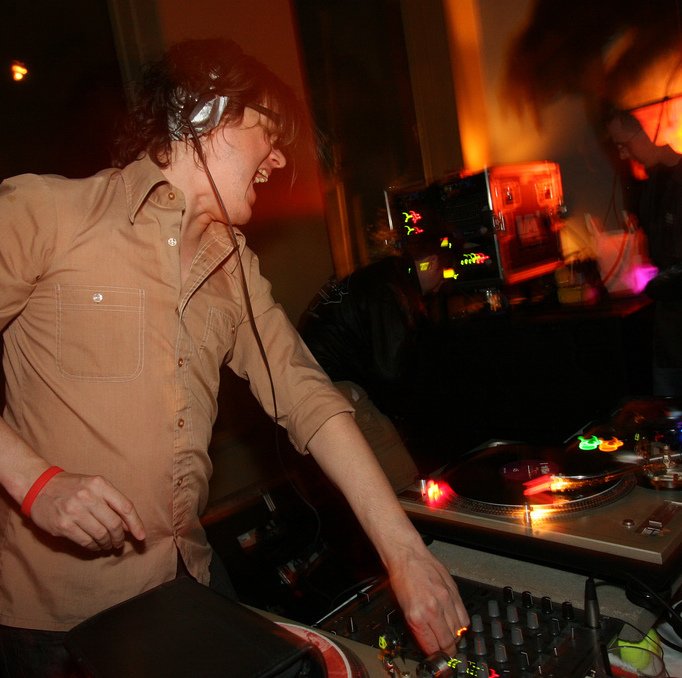
And now:
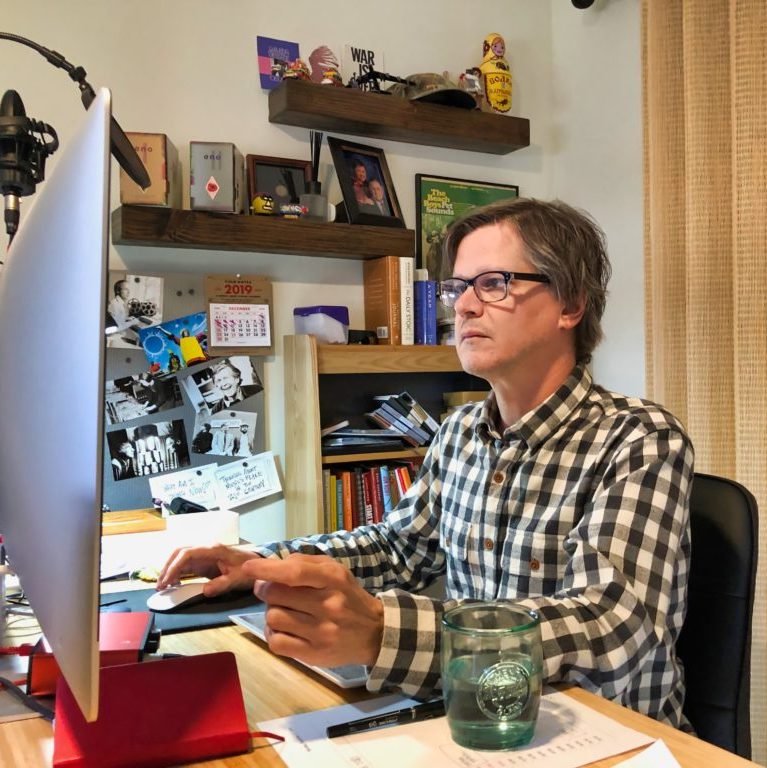
So, today, here's a few samples from 8sided blog.
Enjoy.
https://8sided.blog/not-as-many-yesterdays/
NOT AS MANY YESTERDAYS
• Over the past several months, I’ve been reading not-so-heavy fiction before bed to help clear my head of news-trauma before sleep. I’m using the opportunity to check out books I probably should have read in my teens and college years but didn’t. At the time, I was mainly reading music fanzines1 and Stephen King novels (with the occasional Vonnegut and beat writer interlude), so there’s a lot of catching up to do.
I just finished Isaac Asimov’s The Foundation Trilogy. A lot of people enthusiastically recommended the series, but it didn’t blow me away as I expected.2 I’m glad I read the trilogy, though. There are many thought-provoking concepts, and that’s the least one can want from a book. Also, the storyline of The Mule captivated me. The Mule is a mutant conqueror who can mentally bend people’s emotions to become subservient, effectively enamored by him. What’s most interesting is that these people are aware of their manipulation, but they press on in their devotion. Here’s a passage from Second Foundation:
What kept him from action? What deadened him? There was a time when he was a rebellious and unpromoted captain of the First Foundation’s commercial empire, when it would have been himself rather than Channis who would have taken prompt and daring action such as that. Was the Mule right? Was his controlled mind so concerned with obedience as to lose initiative? He felt a thickening despondency drive him down into a strange lassitude. […]
Pritcher nodded mutely, and cogitated in the sudden loneliness on the evils of approaching fifty. The visiplate was sparsely starred. The main body of the Galaxy misted one end. What if he were free of the Mule’s influence—
But he recoiled in horror at the thought.
I can’t help but equate this to our struggles with social media and the internet in general. Not to mention, how we ‘lose initiative’ through our internet interactions (see: slacktivism). We know we should turn away, but we can’t — it feels too good to persist. File this alongside Wednesday’s ‘Siren’s song’ metaphor.
• Often this blog gets ‘meta,’ and I talk about the joys and processes of blogging. There are many things that I wish I had started earlier (like reading something meatier than music fanzines). I like to think blogging is one of those things. But, I was blogging as soon as the late ’90s. Astralwerks set up a site for me, and I had a ‘dispatches’ page where I could post a tour diary or studio updates. My Q-BAM site had a blog, too. And I’m embarrassed to admit I semi-regularly blogged on MySpace — most of those posts disappeared into the ether.
The problem was that I didn’t blog consistently. If I did post, the content was usually related to promoting an upcoming gig or release, or a tracklist and link to the latest Invisible Airwaves radio show. Occasionally the writer within appeared — here’s a piece I wrote on Tony Wilson from 2007 that I still enjoy seeing — but those pieces were rare.
I’m thinking about this because I ran across a blog post by ex-Google programmer Steve Yegge from 2005. It’s called You Should Write Blogs, and I wish I had read it at the time. Steve is encouraging everyone to blog, and he lays out compelling reasons. Early on in the piece, he writes:
This is certainly the most important thing I’ll ever say in my blogs: YOU should write blogs.
Even if nobody reads them, you should write them. It’s become pretty clear to me that blogging is a source of both innovation and clarity. I have many of my best ideas and insights while blogging. Struggling to express things that you’re thinking or feeling helps you understand them better.
I don’t know if this article would have inspired a blogging (or writing) practice in those years. I certainly didn’t understand how writing in public sharpens the mind, hones opinions, and feels fantastic. No one told me. Or, more likely, I wasn’t listening — I was too busy slurping vodka and playing records in dark rooms.
What’s the cliché? The best time to start something is yesterday, and the second-best time is right now. I’m thankful I started this blog a few yesterdays ago, even if it’s not as many yesterdays as I’d like. For the rest of you, the time is now. Get blogging. Here’s some encouragement of my own.
• This video of David Bowie turning the interview tables on MTV’s Mark Goodman is making the rounds. And with good reason. How cool.
• I’m just putting this here: State Moves Into Unannounced Goth Phase of Reopening
• The news has come over the wire that Jon Hassell is releasing the second installment of his ‘pentimento’ series on July 24. The first one, from 2018, was excellent, so I’m excited to hear its follow-up, Seeing Through Sound. The lead track — “Fearless” — is live, and it’s no surprise that it’s a stunner. Pre-ordered!
I should also mention that there’s a GoFundMe page for Jon Hassell. He’s not in the best of health right now, and the present COVID-19 dangers have made his situation direr. The page was set up by friends and family to help Hassell get financial assistance so he can receive the care he requires. [LINK]
• Lake Holden was looking particularly serene this morning = [LINK]
https://8sided.blog/the-comfort-in-listening/
THE COMFORT IN LISTENING
I haven’t quite settled into the writing rhythm, and putting this week’s newsletter together was a struggle. The working-at-home aspect isn’t a big deal as that’s where I’ve worked for most of my (sorta-)professional life. But the background hum of uncertainty, concern, and — let’s face it — fear throws new challenges into the mix.
I’m not alone in walking a tightrope between ‘now’s the time to get stuff done’ and ‘take it easy for your mental health.’ It’s an unusual juggling act, at least for me. I miss the days — they seem so long ago — when I would get lost entirely in creative tasks, the mind focused straight ahead for hours. It’s been like that for a while, but lately, the distraction dial goes to 11.
It’s about reclaiming space, throwing that bellowing inner voice off to the side. It’s a modern ploy to call this act ‘mindfulness,’ and I’ve regularly meditated for years, but that’s not helping right now. We need solace and beauty — something that whispers hope. We need art now more than ever.
In my review of Jogging House’s beautiful album Lure, I talk about music as an optimistic glimpse at what’s possible. I quote Brian Eno: “One of the reasons one makes music, or any kind of art, is to create the world that you’d like to be in or the world that you would like to try.” And, in the case of music, the listener experiences a taste of this world by losing herself in the sound.
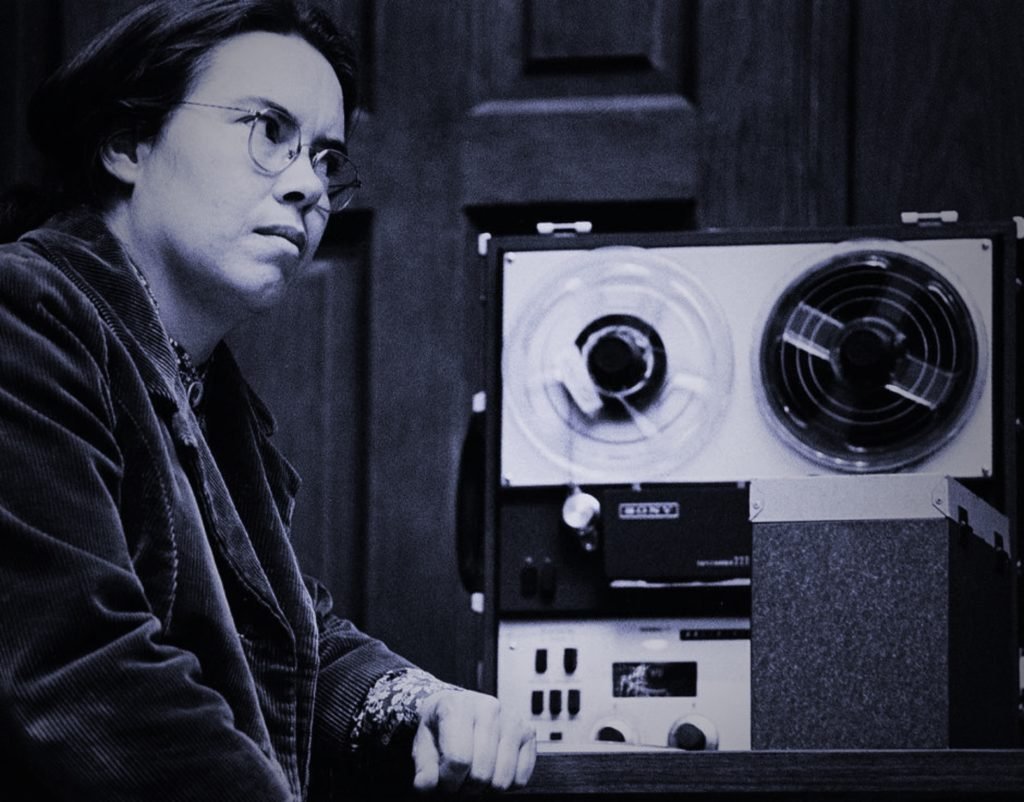
Pioneering experimental composer Pauline Oliveros called this ‘deep listening.’ Deep Listening originally was the title of an album Oliveros recorded with her ‘Deep Listening Band’ in an empty underground reservoir. The space featured a natural 45-second reverb tail, creating washes of sound out of the trombone, didjeridu, accordion, and other employed instruments. There’s no resisting this immersion in sound.
But ‘deep listening’ was soon synonymous of a “radical attention.” Oliveros explained this interpretation as “listening in every possible way to everything possible to hear no matter what one is doing.” It’s the opposite of how most people (myself included) stream music: in the background as a complement to our mood, office productivity, or housework. With deep listening, you LISTEN — no other activity is in the foreground.
Deep listening pops up in Jenny Odell’s How To Do Nothing, which I recommended a few newsletters ago. Odell poses the concept as a resistance to a constant inundation of information and newsfeeds. Oliveros and deep listening also appear in Kyle Chayka’s The Longing For Less, which I’m presently reading. Chayka writes, “Such intense listening is meant to inspire compassion and understanding, a kind of acceptance that goes beyond the noisy concerns of the current moment that usually crowd our consciousness.”
Chayka, citing Oliveros, refers to this listening as “meditating on the organic sounds of nature and experiencing the resonance of unique spaces like caves, cathedrals, or wells.” But our present crisis makes it difficult to go out in public to explore these places. In quarantine, we need to listen deeply at home.
In the Los Angeles Times, Randall Roberts proposes a different take on deep listening: we should do it with albums. Silence your phone and any other potential distractions, set the mood (“Light a candle or not.”), sit comfortably between two speakers or put some nice headphones on, and listen — really listen — to an album from beginning to end. Lose yourself in the sound. Examine the lyrics and the performances. Imagine where the music is taking place. Roberts says, “The point is to listen with your ears in the same way you read with your eyes.”
Though not emphasizing the ‘deep’ aspect, Amanda Petrusich wrote about the reassuring qualities of listening to a favorite album in The New Yorker. (Side note: that article has the coolest gif and I wish I could steal it.) She refers to one album as “a reliable and instantaneous balm, no matter what’s happening to me or the world.” Petrusich also offers this: “The best thing about records is that, even when you don’t have anything left to give, they keep showing up for you.”
I propose we regularly set time aside to lose ourselves in albums. Choose an album and listen without productivity or house chores on the agenda. What should you listen to? A new album is fun, but hearing something for the first time might be too much work. No playlists allowed — only an intentional album song sequence will do. A favorite album or one that’s attached to nostalgia is good. Maybe an album you like but haven’t listened to more than a few times. Or perhaps listen to an album you’ve enjoyed but have only heard in the background while working or cooking or all the other things. Give it the attention it deserves.
Listen. Sit in one place, close your eyes if that’s comfortable for you, and listen with purpose. Pick out all the instruments, hear the acoustics (natural or digital) they’re playing in, follow the lyrics, note how the sequence flows. It could be tricky — sitting still is for meditators, not music buffs. But don’t give up. There will be a moment that you forget what’s going on in this world, replacing it with a “world that you would like to try.” That moment’s why we’re doing this.
What albums come to mind? If you try this out, what albums will you play? Why? I’m so curious. Please let me know in the comments section for the newsletter. I’ll get the thread going with a couple that I’m starting with. These aren’t recommendations, just the albums that are helping us get through this thing. We’re listening together, rooting for each other. It’s what we do.
This post was adapted from Ringo Dreams of Lawn Care, a weekly newsletter loosely about music-making, music-listening, and how technology changes the culture around those things. Click here to check out the latest issue and subscribe.
https://8sided.blog/sweet-jesus-steve-cobbys-one-man-cottage-industry/
SWEET JESUS: STEVE COBBY’S ONE MAN COTTAGE INDUSTRY
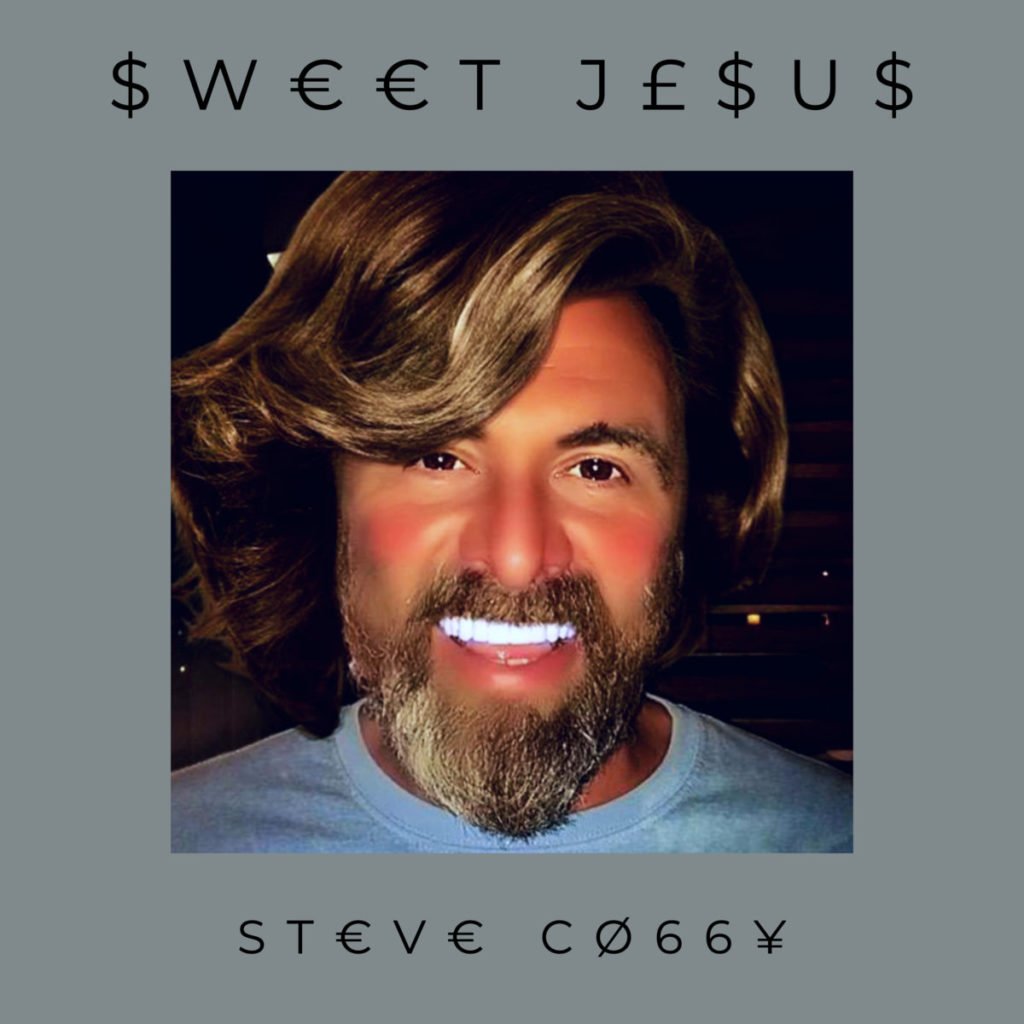
A lazy Friday in May revealed a righteous surprise. Without warning: the arrival of Sweet Jesus. This event wasn’t a religious awakening, but for fans of Fila Brazillia, it was like unexpectedly finding an apparition burned onto the morning toast. Steve Cobby, one half of the aforementioned Fila B, had dropped his latest solo album — yes, Sweet Jesus — on Bandcamp.
The album opens with the ringing strings of a gently played guitar. The thing that always struck me about Fila Brazillia’s oeuvre is its innate organicness. Though considered an electronic band, the duo (Cobby in cahoots with David McSherry) wasn’t afraid to toss in the odd guitar riff, live drum kit, or shite harmonica. As out-of-place as folksy fingerpicking might sound on Sweet Jesus, it’s all part of a modus operandi that’s a long time in motion.
Recognizable elements of Cobby’s velvet-textured production come into play — the intro of “Chauffeur De Camion” brings to mind at least a couple of Fila B’s mid-90s moments — but it’s the renewed intersection with a prominent guitar that inspires imaginative shifts. Notably, there’s “Feline Plastique” which incorporates a rhythmic Latin shuffle alongside a wealth of melodic riffs and optimistic tones. And jazz features more than we’re used to, allowing the guitar to explore on extended cuts like the Liston-Smith-laid-back-space-jam-ish “Truer Than Words.” Introspection rarely feels so sunny.
The mechanics of the release of Sweet Jesus interest me, too. Steve Cobby is no stranger to independent labels. After a stint with the major-aligned Big Life via his band Ashley & Jackson, Cobby played a part in the formation of no less than four different independent imprints. Déclassé is the latest, launched in 2014, and is the home of this new effort. But it appears a one-person operation, making the surprise release of Sweet Jesus an intuitive experiment.
Steve documented the launch of the album in real-time, live-streaming the click of the ‘publish’ button on his Bandcamp account, followed with a listen of the album accompanied by an affable and enlightening commentary.
I’m always curious about artists who thrived in the independent sector pre-Napster and how they operate now. It’s no secret that I’m one of those artists. Though I get excited about the potential of today’s DIY freedom, the changes remain a constant struggle of adjustment. Cobby’s embrace of the Bandcamp and live-stream platforms led me to believe he’s a lot more confident than me in the modern landscape. But, after an email chat, I see he’s playing it by ear like the rest of us.
Says Steve: “[These tactics were] borne of desperation and curiosity. I prefer to be just creating. I never anticipated being an owner-operator at such a late stage in my career, but necessity is invention’s mother. The times have moved a great deal. I wouldn’t say I’ve moved with them 100%. But I have autonomy so I can try out things signed artists might struggle with. The live-stream idea, for instance, only came to me about a week before the planned release on the 10th and the night before I was still tweaking tunes and mastering. I cannot envisage that scenario being duplicated many places where a committee is involved.”
How long did it take to figure some of this out and how rough was the transition?
“2004 to 2014 was a fallow decade for me. Couldn’t get anything to traction with the collaborative releases put out on the labels I co-owned. Once I went completely solo in ’14, consolidated all tasks to myself, and went direct-to-customer it was revolutionary. The light appeared at the tunnel’s end, and I began to earn money again. I’m a digital busker now, and almost everything that goes in the hat comes home. I think this is more like the many-to-many publishing model we’ll move towards. You’re sustained by a very bespoke coterie that you’ve curated.”
But, that’s liberating, right? So much nicer than being under the thumb of a label I’d imagine.
“I would much prefer financial security to be honest. My one man cottage industry is simply the only way I can get my material to market without interference. Certainly far from an ideal. I did enjoy the liberation of delivering an album completely ‘fresh’ and sans promo. But I’ve not worked within the traditional label machine since being signed to Big Life in the late eighties. They were pricks who wanted to dictate what we did and who we worked with. But If I was signed to an open-minded label, then I don’t see why I couldn’t make the same decisions I’m making now. Who knows.”
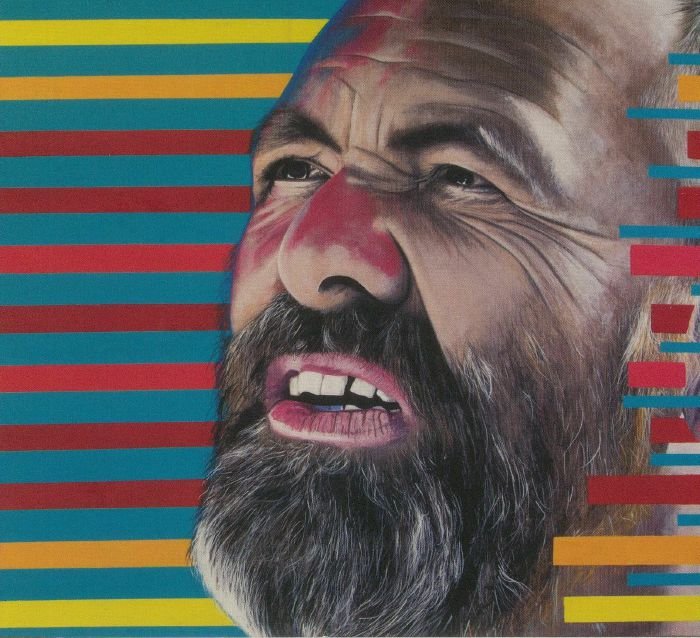
Whatever liberation there might be, a lot of artists are finding that Bandcamp is an essential tool for achieving it. Not only is it often used as a direct-to-artist platform, but Bandcamp also encourages artist fandom rather than passive playlist loyalty. I asked about Bandcamp’s role in Steve’s ‘one man cottage industry,’
“Bandcamp has been key to my turnaround. It’s the platform that delivers uncompressed and compressed downloads as well as streaming whilst taking the smallest cut of any retailer. This release was a Bandcamp exclusive for the first six weeks to help promote some more traffic that way. I’d still bother without it, but the returns would be less as all other online portals are serviced through an aggregator. “
I wondered: was Sweet Jesus‘s surprise release date set in stone and was there any temptation to push it back? And, as Steve was tweaking and mastering the album less than 24 hours before he clicked ‘publish,’ would he ever go back and update any of the tracks, Kanye-style?
“The beauty of the surprise deadline is it can be moved on a whim, but I was confident it was coherent work. I’d set that deadline for myself to avoid over-procrastination. As for reviewing post-release, the egg is fried. I don’t beat myself up once material is published and I would only ever re-upload a track for a technical reason, never creative.”
Despite the backed-into-a-corner nature of a self-release (and I can relate), I’m heartened and inspired by the freshness and ingenuity of Sweet Jesus, both in its playful roll-out to Steve’s fans and its bright, sanguine, and thoughtful sound. But, without any constraints, how would Steve Cobby release this album differently?
He answer: “To fifty thousand subscribers.”
Follow Steve Cobby and his Déclassé label on Bandcamp to help him get closer to that number.
+++++++++++++++++++++++++++++++++++++++++++++++++++++++++++++++++++++++
+++++++++++++++++++++++++++++++++++++++++++++++++++++++++++++++++++++++
+++++++++++++++++++++++++++++++++++++++++++++++++++++++++++++++++++++++
- Bloggery committed by chris tower - 2006.30 - 10:10
- Days ago = 1824 days ago
- New note - On 1807.06, I ceased daily transmission of my Hey Mom feature after three years of daily conversations. I plan to continue Hey Mom posts at least twice per week but will continue to post the days since ("Days Ago") count on my blog each day. The blog entry numbering in the title has changed to reflect total Sense of Doubt posts since I began the blog on 0705.04, which include Hey Mom posts, Daily Bowie posts, and Sense of Doubt posts. Hey Mom posts will still be numbered sequentially. New Hey Mom posts will use the same format as all the other Hey Mom posts; all other posts will feature this format seen here.



No comments:
Post a Comment